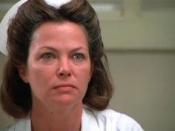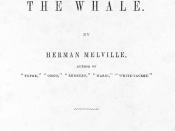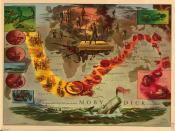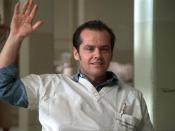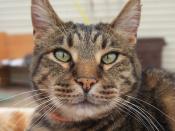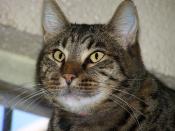Male aggressive dominance McMurphy is linked with the mythical frontier American when he engages in battle with Harding for the position of "Bull Goose Loony": "Then you tell Bull Goose Loony Harding that R. P. McMurphy is waiting to see him and that this hospital ain't big enough for the two of us. I'm accustomed to being top man. I been a bull goose catskinner for every gyppo logging operation in the Northwest and bull goose gambler all the way from Korea, was even bull goose pea weeder on that pea farm at Pendleton-so I figure if I'm bound to be a loony, then I'm bound to be a stompdown dadgum good one. Tell this Hardy that he either meets me man to man or he is a yaller skunk and better be outta town by sunset!" Hardy leans further back, hooks his thumbs in his lapels. "Bibbit, you tell this young upstart McMurphy that I'll meet him in the main hall at high noon and we'll settle this affair once and for all, libidos a-blazin'."
Harding tries to drawl like McMurphy; it sounds funny with his high, breathy voice. (21-22) A further linkage of McMurphy with the heroic (male) American past is forged by the fact that he wears a pair of shorts decorated with "big white whales" which recall Melville's Moby Dick.
Indeed, so that the reader does not miss the allusion, Kesey has McMurphy relate that the person who gave him the shorts was "'a co-ed at Oregon State, Chief, a Literary major'" who made him the present "'because she said I was a symbol'" (69). Melville is a by no means unambiguous writer. Indeed, in Moby Dick, the white whale may be seen as a symbol of impenetrability which forms the book's focus over its "hero" Captain Ahab.
Kesey, however, appears to associate Moby Dick with male aggressiveness/dominance as is shown in this later confrontation between McMurphy and Big Nurse: "What do you think would have happened if one of the young nurses had come in early and found a patient running round the halls without a uniform? What do you think!" The big black boy isn't too sure, but he gets her drift and ambles off to the linen room to get McMurphy a set of greens-probably ten sizes too small-and ambles back and holds it out to him with a look of the clearest hate I ever saw. McMurphy just looks confused, like he don't know how to take the outfit the black boy's handing to him, what with one hand holding the toothbrush and the other hand holding up the towel. He finally winks at the nurse and shrugs and unwraps the towel, drapes it over her shoulder like she was a wooden rack.
I see he had his shorts on under the towel all along.
I think for a fact that she'd rather he'd of been stark naked under that towel than had on those shorts. She's glaring at those big white whales leaping round on his shorts in pure wordless outrage. That's more'n she can take. It's a full minute before she can pull herself together to turn on the least black boy; her voice is shaking out of control, she's so mad. (81) The conflict between McMurphy and Nurse Ratched here founded through the Moby Dick allusion is the motive force behind the novel's whole action. The battle begins with Big Nurse, whose "lips are in that triangle shape, like a doll's lips ready for a fake nipple," deliberately calling McMurphy, "Mr McMurry" (25); that is, she is presented as refusing to acknowledge McMurphy as an individual.
McMurphy attacks Nurse Ratched in sexual terms For his part McMurphy attacks Nurse Ratched in sexual terms (the implication being that her radical anti-male stance stems from her frigidity). In one of the "therapy" sessions early in the book, for instance, there is an exchange between Big Nurse and McMurphy during which the latter relies heavily on sexual innuendo, almost succeeding in unsettling the nurse. She says of Harding: "'He has also stated that his wife's ample bosom at times gives him a feeling of inferiority. So does anyone care to touch upon this subject further?'" McMurphy snaps his fingers, and the nurse responds: "Mr-ah-McMurry?" "Touch upon what?" "What? Touch- " "You ask, I believe, 'Does anyone care to touch upon- '" "Touch upon the-subject, Mr McMurry, the subject of Mr Harding's problem with his wife." "Oh. I thought you meant touch upon her-something else." "Now what could you- " But she stops. She was almost flustered for a second there. (39) McMurphy undermines Big Nurse's power over the other male patients by characterising her as a "bitch," a "buzzard" and a "ball-cutter" (51-52). He wins some major battles with her by asserting the right for the men to "watch" the ball game on TV (111-114) and by organising the deep sea fishing trip (186 ff).
